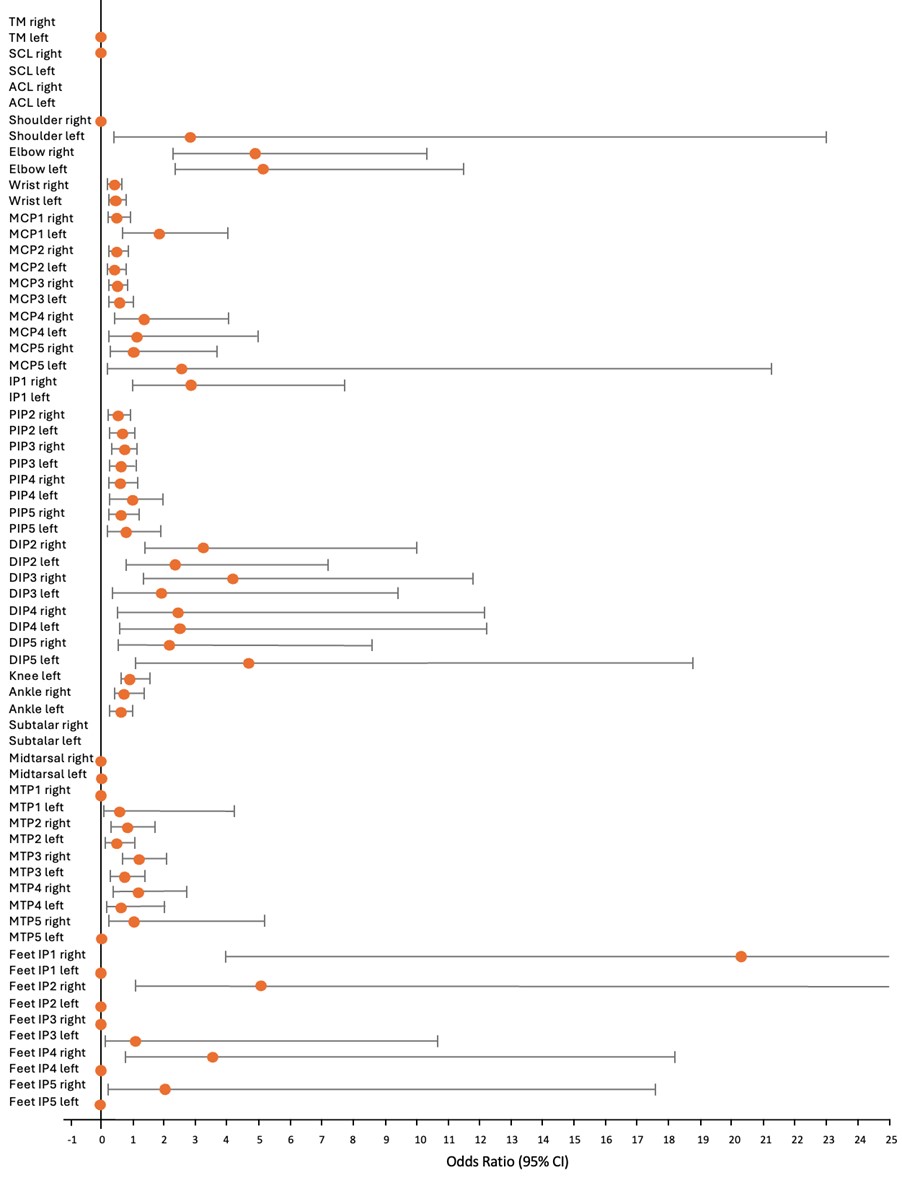Session Information
Date: Monday, November 18, 2024
Title: SpA Including PsA – Diagnosis, Manifestations, & Outcomes Poster III
Session Type: Poster Session C
Session Time: 10:30AM-12:30PM
Background/Purpose: Psoriatic arthritis (PsA) is a chronic inflammatory disease that can cause joint pain, swelling, and stiffness. Patients often experience flares followed by periods of remission. Understanding the recurrence patterns can inform treatment strategies such as intra-articular injections and improve patient outcomes. The aim of this study was to investigate whether arthritis in PsA patients is more likely to recur in the same joint previously affected by the disease.
Methods: The study included PsA patients, who were under routine follow-up at the Tel
Aviv Medical Center Rheumatology Institute from 2016 to 2023. Data was obtained from the
TASMC data warehouse using MDClone software. Patients with at least 3 visits were
included. The medical chart of the Rheumatology Institute includes a “joint examination”
component, which allows to record consecutive test results of 68 swollen joints as per
examiner opinion. Recurrence was defined as relapse of joint swelling during physical
examination, after absence of swelling for at least 6 months at the same joint. Missing
assessments were considered as absence of joint swelling. The association between baseline
joint swelling and recurrence was assessed in mixed-effects logistic regression models
adjusted for joint location and for visits during follow-up. Additionally, an interaction
analysis was done to determine the association of each different joint location. The most
frequent swollen joint at baseline (right knee) was used as reference joint. A sensitivity
analysis was performed including only joints with at least a 10% of swollen frequency at
baseline
Results: 492 patients were included, with a median (IQR) of 6 (4-9) follow-up visits. 44%
were male, with a mean (SD) age at baseline of 48 (15) years old, and a mean disease
duration of 1 year (1.9). 420 patients had at least 1 swollen joint at baseline, with a median
SJC of 2 (1-5). From 33456 joints assessed at baseline, 1402 were swollen (4.2%), and 514
(36.7%) of them recurred at least once during follow-up. The mixed model analysis showed
that baseline swelling at a specific joint was predictive for swelling during follow-up (OR
2.88 [95% CI 2.61-3.18, p< 0.001]) if the joint was swollen at baseline. This association was
different for each joint location, with the highest for ORs for left and right elbow (Figure 1), and it was
not modified by sex, age or disease duration. In a sensitivity analysis, when only considering
the most affected joints, baseline swelling remained predictive of recurrences, although the
association decreased (OR 1.51 [1.31-1.75], p< 0.001).
Conclusion: This study found a strong association between baseline joint swelling and
subsequent joint swelling episodes at the same joint in patients with PsA. This association
varied by joint location and remained significant even when considering only the most
frequently swollen joints. These findings suggest that baseline joint swelling can be a
valuable predictor of future disease activity in PsA. This may insinuate the presence of sub
clinical persistent inflammation in these joints suggesting the need for intra- articular anti-
inflammatory intervention in addition to systemic treatment.
To cite this abstract in AMA style:
Capelusnik D, Elkayam O, Berman M. Assessment of the Likelihood of Joint Inflammation Recurrence in Previously Affected Joints During Psoriatic Arthritis Disease Course [abstract]. Arthritis Rheumatol. 2024; 76 (suppl 9). https://acrabstracts.org/abstract/assessment-of-the-likelihood-of-joint-inflammation-recurrence-in-previously-affected-joints-during-psoriatic-arthritis-disease-course/. Accessed .« Back to ACR Convergence 2024
ACR Meeting Abstracts - https://acrabstracts.org/abstract/assessment-of-the-likelihood-of-joint-inflammation-recurrence-in-previously-affected-joints-during-psoriatic-arthritis-disease-course/

